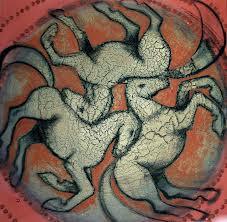To be sent out with no purse or provisions as lambs into the midst of wolves doesn’t sound so promising unless the success of the mission does not depend on the missionary. In fact, the kingdom of God comes near the house that welcomes peace and the house with the “No Soliciting” sign. Where the kingdom is recognized healing happens. Where it is not recognized the kingdom stands as a sentence against the shortsighted as they are left to their own devices which are always less than what the kingdom offers. The dust shaking judgment anticipates the woes in the verses the lectionary leaves out. It is a litany of losers, where even sin city Sodom is better off “in that day” than the cities who choose not to welcome peace. But even those who proclaim peace don’t quite recognize the kingdom come near for they rejoice not in the name of Jesus but in the power they wield with his name. Jesus redirects their joy from submitting spirits to their names written in the final kingdom come. And if the one despised and rejected, the Lamb who led to the slaughter and before his shearers was dumb, is the one who writes the names recorded in heaven maybe there is hope even for the litany of losers?
Thursday, June 30, 2022
Wednesday, June 29, 2022
Lectionary 14 C - Galatians 6:1-16
Tuesday, June 28, 2022
Lectionary 14 C - Psalm 66:1-9
Monday, June 27, 2022
Lectionary 14 C - Isaiah 66:10-14
Isaiah’s vision of the exile’s return to Jerusalem to be nursed and carried on her arm and dandled on her knees was not realized even by the rejoicing of the returning exiles reclaiming the Promised Land because of the opposition and violence and bloodshed that greeted them. (Ezra 4) In our time devout Jews gather at the Wailing Wall to pray for the restoration of the temple as Palestinian Christians weep at walls that surround and separate them from the part of the Promised Land that is their home and all the while God weeps over the plight of all people who love Jerusalem. But in the dream of God’s design those who rejoice in her and those who mourn because of her will both be comforted by her. In the dream of God’s design Jerusalem is for all people a place of peace where the feast that never ends will begin. It may be that we have to do more than pray for the peace of Jerusalem for the dream of God’s design to come true, but not by denying the right of Jewish people to live in safety or by denying the plight of the Palestinian people imprisoned in their own land. The hatred that exists and is the cause of such suffering will only be overcome when each sees in the other the dream of God’s design.
Friday, June 24, 2022
Lectionary 13 C - Luke 9:51-62
Wednesday, June 22, 2022
Lectionary 13 C - Galatians 5:1, 13-25
Thursday, June 16, 2022
Lectionary 12 C - Luke 8:26-39
Wednesday, June 15, 2022
Lectionary 12 C - Psalm 22:19-28
Tuesday, June 14, 2022
Lectionary 12 C - Isaiah 65:1-9
Thursday, June 9, 2022
The Feast of the Holy Trinity Year C - John 16:12-15

I'm blogging from the Headwaters Saloon in Harper, Texas after my first day working horses with wrangler Lorianne at Ebert Ranch. It's taken a shower and a Shiner to get me thinking about the Trinity even though I rode three different horses today and I suppose green broke Miss Candy was wild enough to be the Spirit to Cisco the Father and Tom Too the Son. But that's the problem with the three in one and one in three Trinity. It takes some thinking and is still beyond what mortal minds can bear. Of course everything about God is beyond our frame of reference since God is not like us. Even the flesh and blood Son who was like us in every way was "without sin" (Hebrews 4:15) which means he's pretty much not like us at all. At Calvary we make the intern preach on Trinity Sunday so that we can make sure he or she is not a heretic. It's a sign of progress that we can joke about such a thing rather than banishing or worse burning at the stake those whose musings on the mystery stray from the status quo. Maybe we should just say the Trinity was God's idea and not ours and explaining the nature of God by means of analogy is always lacking. So the Father Son Spirit beyond our ability to bear comes down to lead us into the only truth that counts. God is love and the best way to understand that is for us to love one another and not worry too much if our description of the Trinity canters into an equestrian modalism.











